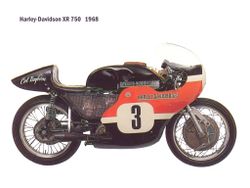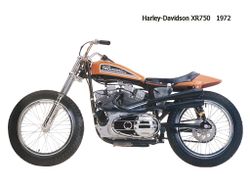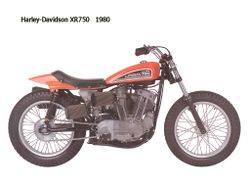Difference between revisions of "Harley-Davidson XR750"
| Line 5: | Line 5: | ||
but this time the bore/stroke ratio was oversquare. Quadruple camshafts in the crankcase controlled the overhead valves, giving tuners the widest possible range of latitude in engine timing. | but this time the bore/stroke ratio was oversquare. Quadruple camshafts in the crankcase controlled the overhead valves, giving tuners the widest possible range of latitude in engine timing. | ||
==An American Art Form== | ==An American Art Form== | ||
These machines only developed 73 horsepower at 7600 rpm and their cast-iron heads, derived from those of the [[Harley-Davidson XL1200|Sportster]], posed serious cooling problems. Harley was back on target in 1972 with a second version fitted with aluminum heads. It delivered 87 hp at 7800 rpm and could easily top 100 hp when race prepared with such items as electronic ignition and [[Mikuni]] [[carburetors]]. The secret of Harley's domination of dirt track racing is the suitability of the XR, the torque of its V-twin engine,the wide choice of gear sets and the extraordinary way it gets the power down on to the track. Studded tires are banned on the oval dirt tracks and, at over 110 mph, riders depend on their mastery of the art of broad sliding. | These machines only developed 73 horsepower at 7600 rpm and their cast-iron heads, derived from those of the [[Harley-Davidson XL1200|Sportster]], posed serious cooling problems. Harley was back on target in 1972 with a second version fitted with aluminum heads. It delivered 87 hp at 7800 rpm and could easily top 100 hp when race prepared with such items as electronic ignition and [[Mikuni]] [[Carburetor|carburetors]]. The secret of Harley's domination of dirt track racing is the suitability of the XR, the torque of its V-twin engine,the wide choice of gear sets and the extraordinary way it gets the power down on to the track. Studded tires are banned on the oval dirt tracks and, at over 110 mph, riders depend on their mastery of the art of broad sliding. | ||
==1968== | ==1968== | ||
Revision as of 18:19, 26 March 2007
A History of Dirt Track
Dirt-track racing, a long time favorite sport in the USA, has been controlled since 1954 by the American Motorcycle Association. Four types of paved and unpaved tracks are recognized: Mile, Half-Mile, Quarter Mile and TT. The rider with the most points has the privilege of carrying "#1" -a privilege that almost always falls to Harley.
A Very Special Harley
The Harley XR appeared in 1970 as a replacement for the aging side-valve 750cc KR. Its new engine was still a traditional V-twin but this time the bore/stroke ratio was oversquare. Quadruple camshafts in the crankcase controlled the overhead valves, giving tuners the widest possible range of latitude in engine timing.
An American Art Form
These machines only developed 73 horsepower at 7600 rpm and their cast-iron heads, derived from those of the Sportster, posed serious cooling problems. Harley was back on target in 1972 with a second version fitted with aluminum heads. It delivered 87 hp at 7800 rpm and could easily top 100 hp when race prepared with such items as electronic ignition and Mikuni carburetors. The secret of Harley's domination of dirt track racing is the suitability of the XR, the torque of its V-twin engine,the wide choice of gear sets and the extraordinary way it gets the power down on to the track. Studded tires are banned on the oval dirt tracks and, at over 110 mph, riders depend on their mastery of the art of broad sliding.
1968
1972
1980


